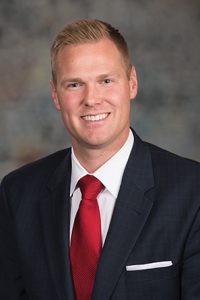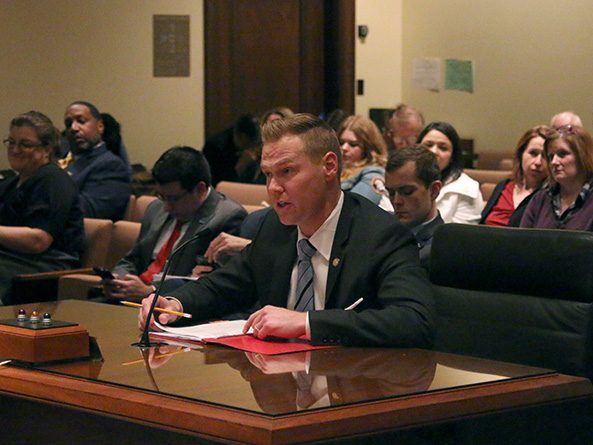Bill would change tax brackets, rates and end some exemptions
The Revenue Committee heard testimony Feb. 15 on a bill that would restructure the state’s income tax brackets and expand the sales tax base.

LB452, sponsored by Omaha Sen. Brett Lindstrom, would eliminate the lowest income tax bracket and gradually reduce the top income tax rate beginning with the 2018 tax year. The current top tax rate of 6.84 percent would be reduced annually through 2025 until that rate is reduced 5.99 percent.
Lindstrom said reducing personal and corporate income taxes is an important first step in providing broader tax relief.
“We [would] collapse the tax brackets to help out working families and give the majority of Nebraskans income tax relief,” he said. “LB452 should be part of a comprehensive package and a prudent step forward with triggers to achieve tax relief.”
Under the bill, the Tax Rate Review Committee would be directed to examine the expected rate of revenue growth each year, beginning in 2019. If the expected rate of growth does not exceed 3.5 percent, any reductions in the top tax rate would be deferred. Such a deferral would remain in effect until the expected rate of growth exceeds 4.2 percent.
LB452 also would create one single corporate income tax rate of 7.58 percent. It similarly would be reduced each year through 2025 until that rate is 5.99 percent. Reductions in the corporate tax rate likewise would be subject to the expected rate of growth limitations placed on the income tax rate reductions.
The personal exemption credit would be reduced incrementally based upon federal adjusted gross income (AGI) for single, head of household and married, filing separately as follows:
• 10 percent if AGI is greater than or equal to $75,000 but less than $85,000;
• 20 percent if AGI is greater than or equal to $85,000 but less than $95,000;
• 30 percent if AGI is greater than or equal to $95,000 but less than $105,000;
• 50 percent if AGI is greater than or equal to $105,000 but less than $115,000;
• 75 percent if AGI is greater than or equal to $115,000 but less than $125,000; and
• 100 percent if AGI is greater than $125,000.
For married filing jointly, the phase-out percentages remain the same but the AGI thresholds are double the amounts listed for the other filing statuses.
The bill also would impose sales and use tax on services including:
• storage and moving services;
• personal care services including hair care, hair removal, massage, nail care, skin care, tanning, tattoos, other body modifications and other beauty and personal care services;
• local taxi, limousine or other luxury vehicle services and any other local ground transportation services provided by motor vehicle;
• dry cleaning and other laundry services, including coin-operated machines used for dry cleaning or other laundry services; and
• newspapers and lottery tickets.
Jim Vokal, chief executive officer for the Platte Institute, testified in support of the bill. He said it would simplify and unify the state income tax system and create a standard tax rate for all businesses in Nebraska.
Sales tax exemptions for services have become outdated as the economy has transitioned from a goods to service-based economy, Vokal said.
“Today we have an increasingly service-based economy and the sales tax code needs to be updated to reflect this change,” Vokal said. “LB452 provides many tools for building a tax system in Nebraska that provides needed revenue and can help remove barriers to economic growth.”
Renee Fry, executive director of the OpenSky Policy Institute, opposed the bill, saying the proposed tax cuts would provide very little relief to most Nebraskans and large tax cuts for the wealthiest citizens.
“Nebraska earners who make between $43,000 and $67,000 would see an average annual tax cut of $14,” she said. “On the other hand, the wealthiest 1 percent of Nebraskans — those who make more than $509,000 annually — would receive average tax cuts of $5,381.”
Representing the Nebraska Board of Massage Therapy, Steve Carper opposed LB452, saying that categorizing massage therapy as a personal care service is inaccurate. Massage therapy is not only a luxury service, but a form of healthcare for many people, he said.
“We do not feel massage therapy should be taxed as a personal care service because it really belongs in the category of alternative and complimentary medicine,” he said. “Imposing a tax on massage therapy would be doing a disservice to the clients who rely on those services for pain relief.”
Opposing the tax on lottery tickets was Chris Kircher, chairman of the Nebraska State Fair Board. Taxing lottery tickets could lead to declining sales, which in turn would lead to declining funding for the state fair, he said.
“A tax on lottery ticket sales will seriously damage our ability to continue providing a first rate event that Nebraskans have come to expect,” he said. “It could lead to a possible rise in ticket prices that won’t allow all Nebraskans to attend the fair.
The committee took no immediate action on the bill.


